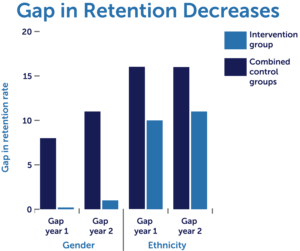We had a problem
Our students were underperforming and unmotivated. We had dropout rates of around 50%, and large differences in the academic performances of male and female students.
At the same time, many of our students didn’t have goals and were drifting through their studies without a conscious choice about their direction.
More ECTS, better retention
The implementation of the goal-setting programme had positive effects at RSM. We got significant improvements in the number of credits (ECTS) earned, and in the number of students retained in the study programme – and these effects remained when controlling for age, gender, registration date, personality traits, motivational aspects, and secondary school performance.
It’s clear that analysing students’ detailed writing about their goals predicts study success, and there’s a linear relationship between the extent of students’ participation in the goal-setting programme and their academic performance.
Positive results
In 2011, we implemented the goal-setting programme at three faculties of Erasmus University Rotterdam, at Hogeschool Rotterdam, Avans Hogeschool, Ijselcollege, Segbroek College and Fioretti College.
Our programme managers noticed a difference. "We sensed that this cohort was doing much better than previous cohorts," says Prof. Michaéla Schippers. “At the end of the year we did the math: the intervention had led to a 20% overall improvement in the number of credits (ECTS) and retention.
We got 77 more BSc Bedrijfskunde students to stay on the course. They got their 40 ECTS (this has since risen to a mandatory 60 ECTS) and were able to continue their studies. “Some groups especially benefited – for example for male ethnic minorities there was a 50% improvement. The gender and ethnicity gaps decreased, and struggling students started to do much better.”
We have maintained that level of improvement over the past 6 years; it means we kept around 450 students from potentially dropping out and helped them find purpose in life leading to less stress, more confidence, more clarity, and a better immune system.
We were surprised to find that it doesn’t matter what kind of goals that students set. Simply the act of setting a goal improves performance. They just need to have a goal.
You can read much more about our research into goal-setting here.



